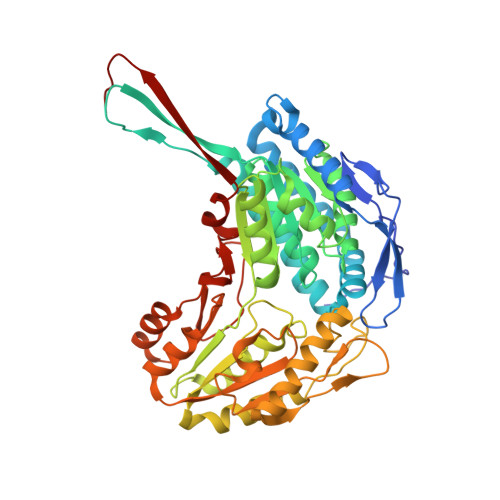Development of substituted benzimidazoles as inhibitors of human aldehyde dehydrogenase 1A isoenzymes.
Takahashi, C., Chtcherbinine, M., Huddle, B.C., Wilson, M.W., Emmel, T., Hohlman, R.M., McGonigal, S., Buckanovich, R.J., Larsen, S.D., Hurley, T.D.(2024) Chem Biol Interact 391: 110910-110910
- PubMed: 38364885
- DOI: https://doi.org/10.1016/j.cbi.2024.110910
- Primary Citation of Related Structures:
8T0N, 8T0T - PubMed Abstract:
Aldehyde dehydrogenase 1A (ALDH1A) isoforms may be a useful target for overcoming chemotherapy resistance in high-grade serous ovarian cancer (HGSOC) and other solid tumor cancers. However, as different cancers express different ALDH1A isoforms, isoform selective inhibitors may have a limited therapeutic scope. Furthermore, resistance to an ALDH1A isoform selective inhibitor could arise via induction of expression of other ALDH1A isoforms. As such, we have focused on the development of pan-ALDH1A inhibitors, rather than on ALDH1A isoform selective compounds. Herein, we report the development of a new group of pan-ALDH1A inhibitors to assess whether broad spectrum ALDH1A inhibition is an effective adjunct to chemotherapy in HGSOC. Optimization of the CM10 scaffold, aided by ALDH1A1 crystal structures, led to improved biochemical potencies, improved cellular efficacy as demonstrated by reduction in ALDEFLUOR signal in HGSOC cells, and substantial improvements in liver microsomal stability. Based on this work we identified two compounds 17 and 25 suitable for future in vivo proof of concept experiments.
Organizational Affiliation:
Department of Biochemistry and Molecular Biology, Indiana University School of Medicine, Indianapolis, IN, 46202, USA.

















